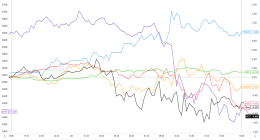
The idea of eating an anchovy lasagne or a herring Wellington might not sound too appealing.
But a new study is calling for meat-lovers to ditch their favourite red meat in favour of cheap, oily fish.
Researchers say that eating sardines, herrings and anchovies instead of red meat could save up to 750,000 lives a year globally.
It could also reduce the prevalence of diseases such as diabetes caused by bad diet.
As well as having the lowest carbon footprint of any animal food source, so-called forage fish – which are often preyed upon by larger species – are rich in calcium, vitamin B12 and omega-3, which may prevent heart disease.


The idea of eating an anchovy lasagne or a herring Wellington might not sound too appealing. But a new study is calling for meat-lovers to ditch their favourite red meat in favour of cheap, oily fish
Non-communicable disease linked to red and processed meat caused 70 per cent of deaths globally in 2019.
Coronary heart disease, stroke, diabetes, and bowel cancer made up 44 per cent of the total.
As part of a study published in the British Medical Journal, researchers from Australia and Japan found that if fish-based diets were ‘widely adopted’ they could prevent 750,000 deaths and could avert up to 15 million years of life lived with a disability caused by diet-related illness by 2050.
Three-quarters of the forage fish caught is ground into fishmeal and other products mostly used for fish farming.
The researchers also wrote that climate change warning labels on menus and supermarket products could encourage people to change their diets.


The researchers also wrote that climate change warning labels on menus and supermarket products could encourage people to change their diets
But lead author Shujuan Xia, from the National Institute for Environmental Studies, Tsukuba, Japan, said: ‘Despite the theoretical potential of forage fish, several barriers, such as fish meal and oil processing, overfishing, climate change and cultural acceptance may prevent the health benefits of forage fish from being realised.
‘Prioritising access to affordable fish, such as forage fish, for the poor and promoting the use of nutrient-rich microalgae as fish feed, could help to address some of these barriers.’
While the existing supply of forage fish is insufficient to replace all red meat, researchers say it could potentially increase everyone’s consumption of fish to close to the recommended daily level by 2050.









